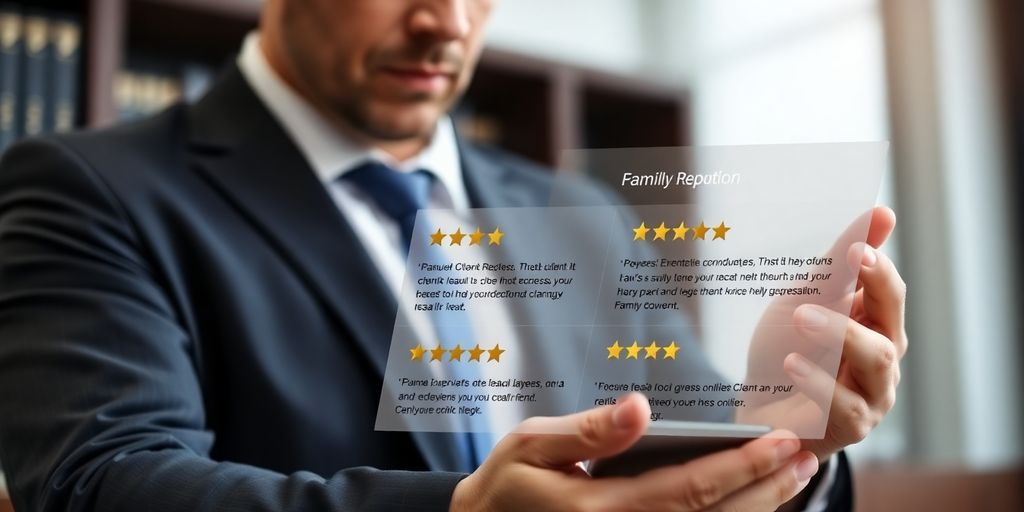Running a family law practice means you're constantly juggling client needs, court dates, and paperwork. But what if you could make the first point of contact with potential clients much smoother and more efficient? A virtual receptionist for family lawyer can do just that. It's like having an extra team member who's always available, handling calls and initial questions so your staff can focus on the legal work that truly matters. This technology is changing how law firms connect with people, making things easier for everyone involved and helping your practice grow.

When you're running a family law practice, the phone is basically your lifeline. It's how potential clients reach you, how existing clients get updates, and honestly, how you get a lot of your new business. But let's be real, you're probably swamped with court dates, client meetings, and all the paperwork that comes with it. That's where a service like Smith.ai really shines.
Smith.ai offers a blend of human receptionists and AI technology, aiming to handle your calls efficiently and professionally. They don't just pick up the phone; they're trained to screen calls, qualify leads, and even schedule appointments right then and there. This means fewer missed opportunities and less time spent on administrative tasks that pull you away from practicing law. They also have options for outbound calls, which can be super handy for following up with potential clients or sending out reminders. It’s like having an extra team member, but without the overhead of hiring someone full-time.
Smith.ai provides a pretty robust set of features that are particularly useful for family lawyers:
The impression a potential client gets from the very first interaction can really make or break whether they choose your firm. Having a professional, responsive service handle those initial calls can significantly boost your chances of securing new business.
Smith.ai has a few different plans, and they're pretty transparent about their pricing. You can get started with their Starter plan, which includes a set number of calls per month, with additional calls billed at a per-conversation rate. They also have higher-tier plans for firms with more call volume. It’s worth looking at their various plans to see which one best fits your firm's needs and budget. They also offer add-ons, so you can customize the service further.
When you're running a family law practice, you need more than just someone to answer the phone. You need a virtual receptionist service that understands the unique demands of the legal field. This means looking for features specifically designed to help lawyers manage their cases and clients more effectively.
It's a big deal if your answering service knows its way around legal terms. They should be trained to handle client intake properly, asking the right questions without getting confused. This helps make sure you get all the necessary information for new cases right from the first call. A service that understands legal workflows can make a huge difference in how smoothly your practice runs.
Legal issues don't stick to a 9-to-5 schedule. Clients might need to reach you late at night or on a weekend, especially in family law where things can get pretty urgent. Having a receptionist available around the clock means you won't miss out on potential clients or important updates from current ones. It shows you're always there for them.
Every law firm is a bit different, right? You might have specific ways you want new clients to be greeted or particular information you need collected during the initial call. A good virtual receptionist service will let you create custom scripts. This way, every caller gets the same professional experience and the receptionists gather exactly what you need for your case files. It’s like having a consistent intake process every single time.
Lawyers deal with a lot of private client information. The virtual receptionist service you choose needs to be trustworthy and have strong data privacy protocols. They should be able to handle sensitive details securely, just like your in-office staff would. This builds trust with your clients and keeps you compliant with privacy laws. You can find services that are HIPAA-compliant, which is a good sign they take privacy seriously. For example, some services can help with client birthdays and special occasions, adding a personal touch while respecting privacy.
In family law, you often work with people from all sorts of backgrounds. If your practice serves a diverse community, having receptionists who can speak multiple languages, like Spanish, is a major plus. It breaks down communication barriers and makes more people feel comfortable reaching out to your firm. This can really help expand your client base and make your services more accessible to everyone.
When you're looking at virtual receptionist services for your family law practice, figuring out the cost and how the plans work is a big deal. You don't want to get stuck paying for more than you need, or worse, have a plan that can't keep up if your firm suddenly gets busy. It’s like picking a cell phone plan – you need one that matches how much you actually use it.
Most services have a few ways they charge. Some charge you per call, which can be good if your call volume is all over the place. Others have a flat monthly fee, which makes budgeting easier. Then there are tiered plans, where you pay more for more features or a higher number of minutes. It’s really about finding the model that fits your firm’s specific needs.
Beyond the basic call answering, check what else is included. Does the price cover appointment scheduling? What about lead screening or outbound calls? Some services might charge extra for these, while others bundle them in. Make sure you know exactly what you’re paying for.
Your firm isn't going to stay the same size forever, right? A good virtual receptionist service should be able to grow with you. This means they should have options to easily add more minutes or features as your call volume increases, without a huge hassle or a massive price jump. You want a partner that can handle your success.
Look out for contract terms. Are you locked into a year-long commitment, or can you go month-to-month? For many family law practices, especially those just starting out or experiencing fluctuating workloads, month-to-month flexibility is a big plus. It lets you try out a service and switch if it’s not the right fit, without being tied down.
It’s important to compare the cost per minute across different providers, especially if you anticipate a high call volume. Sometimes a slightly higher monthly fee for a larger minute package can actually be more cost-effective than paying per minute for every single call.

When you're looking at virtual receptionist services, it's super important to think about how well they play with the tools your law firm already uses. You don't want to add another piece of software that just sits there, right? The goal is to make everything work together smoothly, saving you time and cutting down on mistakes.
Think of your AI receptionist as a central point that links up all your important business software. Good integration means your AI can do more than just answer calls; it can actually update your other systems. This keeps everything in sync and makes your whole operation run better. It's like giving your business a digital nervous system.
Zapier is a really handy tool that connects over 9,000 different apps. If you're using a CRM, a calendar, or document management software, Zapier can probably link it up with your virtual receptionist. This means you don't have to switch out your current tools to get the benefits of automation. You can create automated workflows that save a lot of time and reduce errors.
AI can help set up smart workflows to sort out who's who. New inquiries can get tagged, people you need to follow up with get their own label, and existing cases are marked. This helps your team know who to talk to first. Plus, AI can pull important bits from conversations and create summaries, so your staff can quickly get up to speed on a client's situation without reading through pages of notes. This is a real time-saver for busy law practices.
The ability for your virtual receptionist to communicate with your other business tools isn't just a nice-to-have; it's a strategic move for better efficiency and client management. It means less manual data entry and fewer errors, freeing up your team to focus on legal work.
When choosing a service, consider how it fits with your existing tools alongside the cost. Some services charge per call, while others have a flat monthly fee. You need to figure out which model works best for your firm's call volume and budget. It’s like picking a phone plan – you want one that matches how much you actually use it.

When picking a virtual receptionist service, checking out what other law firms say is a really smart move. You want to know if they're good at what they do, right? Think about it – these folks are the first impression for many potential clients. Their reputation can directly impact how many new cases your firm lands.
It's not just about answering the phone; it's about how they handle those calls. Do they sound professional? Do they gather the right information? Are they friendly and helpful? Looking at reviews can give you a good idea of this. You can often find feedback on sites like Google, Yelp, or even industry-specific forums. Some services even highlight testimonials on their own websites, which can be helpful, though remember they'll likely pick the best ones.
Here’s what to look for in reviews:
It’s also a good idea to see how they stack up against others. While direct comparisons can be tricky, general sentiment in reviews can point you in the right direction. For instance, some services might be praised for their advanced features, while others get props for their affordability. Understanding these differences helps you match the service to your firm's specific needs. If you're looking to improve your firm's overall client communication, exploring options like My AI Front Desk could be beneficial.
Remember, a virtual receptionist is an extension of your law firm. Their performance reflects directly on your practice. Don't underestimate the power of a good first impression, especially when it comes to securing new clients.
As your family law practice grows, so does the number of people trying to reach you. It’s a good problem to have, but you need a system that can keep up. Trying to handle a sudden influx of calls with too few resources can lead to missed opportunities and frustrated potential clients. Answering every call professionally, no matter how busy you are, is key to capturing new business.
Think about your busiest days. Are you running a marketing campaign? Did a local news story mention something relevant to family law? These events can cause your phone lines to light up. A virtual receptionist service designed for high call volumes can manage this without you breaking a sweat. They can handle hundreds, even thousands, of calls at once, making sure no one gets a busy signal.
Here’s a breakdown of how different call volumes might be handled:
It’s also worth considering how these services integrate with your existing systems. For example, some providers like Smith.ai offer robust integrations that can help manage leads generated from higher call volumes.
You don't want to outgrow your phone answering service. Choosing a provider that can scale with you means you won't have to switch services later. It's about building a foundation that supports your practice's expansion, not hinders it. This kind of forward-thinking approach saves headaches down the road.
When comparing providers, look at their capacity for simultaneous calls. Some services might advertise a certain number of minutes, but what really matters is how many calls they can handle at the same time. This is especially important if you're using a service like My AI Front Desk which offers plans that can scale to meet demand.
Family law cases often involve sensitive personal matters, and clear communication is absolutely key. When potential clients or existing clients speak different languages, having a receptionist who can bridge that gap makes a huge difference. It’s not just about understanding words; it’s about building trust and making people feel comfortable during what can be a really stressful time. Offering bilingual support shows you're a firm that welcomes everyone.
Here’s why it’s so important:
Many virtual receptionist services now offer English and Spanish bilingual support. This is a big plus for family law firms, as it directly addresses the needs of a significant portion of the population. For example, services like Smith.ai can provide this crucial support, ensuring your firm is accessible to a broader client base.
When choosing a service, ask about their bilingual capabilities. Some might have dedicated bilingual agents, while others might have a pool of staff who can handle calls in multiple languages. Understanding their approach helps you pick the best fit for your firm's specific needs and client demographics.
It’s not just about having a machine answer the phone; it’s about making that machine work with your human team. Think of it as a partnership. The AI handles the initial contact, gathering basic info, and answering frequently asked questions, freeing up your paralegals and attorneys for more complex tasks. This blend of AI efficiency and human touch is where the real magic happens for client service.
When your AI receptionist can talk to your other software, things get a lot smoother. For instance, when a new potential client calls, the AI can grab their name and number and send it straight to your CRM. Then, your CRM can update the client's status back to the AI system. This keeps all your data in sync, cutting down on manual entry and the mistakes that come with it. It’s like having all your business tools have a quiet chat with each other to keep things organized.
AI can do more than just answer calls; it can manage client interactions using smart workflows. If someone calls asking about your firm’s process for a specific family law matter, the AI can give a detailed, pre-approved answer or tell them what to do next. It can even send text messages automatically based on the conversation. For example, if a client asks about your rates, the AI can instantly text them a link to your pricing sheet. This means no pausing the call to find and send documents. It’s about giving people information right when they need it, without any delay. You can learn more about how services like My AI Front Desk can help with this.
Think about all those initial client forms. They can be a real hassle, right? AI can take over a lot of that busywork. It helps fill out forms automatically by pulling information from emails, documents, or even what people type online. For example, if a client sends an email with their basic info, the AI can grab that and put it right into the client intake form. This saves a ton of time and cuts down on mistakes. It’s about making the entire process smoother from the very first contact.
Beyond just figuring out who to call, AI can also handle some of the more time-consuming parts of intake. Imagine AI automatically filling out initial client information forms based on an email or a web review. This can really help when you're trying to manage your leads. This technology isn't just about saving money; it's a smart move for growth and better client relationships. The way people connect with law firms is changing, and fast. Clients today want quick answers and easy ways to get in touch, not just during typical business hours. This is where AI really steps in to make a difference. You can learn more about how law boutique owners can use these tools.

When potential clients reach out, the first impression is everything. AI front desk solutions are changing how law firms handle these initial interactions. Instead of waiting on hold or leaving a voicemail, clients can get immediate assistance. This instant responsiveness makes them feel heard and valued right from the start. It’s about making sure that every person who tries to reach you gets a response, not a busy signal. This consistent availability is key to capturing leads that might otherwise go to a competitor.
GatheringAI can handle the initial screening of potential clients. It can ask standard questions, gather basic case details, and even check for conflicts of interest. This means your paralegals and attorneys aren't spending valuable time on these preliminary steps. Instead, they can focus on clients who are a good fit and have serious legal needs. Think of it as a filter that lets only the most relevant inquiries reach your team, saving everyone time and effort. This process can be integrated with tools that help with lead qualification.
AI can set up smart workflows to sort out who's who. Think of it like this: new inquiries get tagged, people you need to follow up with get their own label, and existing cases are marked. This helps your team know who to talk to first, so no one's wasting time. It’s a smart way to manage your client pipeline and ensure that follow-ups happen promptly. This system can help organize your contacts, much like a practice management software would, but focused on the initial communication flow.
When you're running a family law practice, every minute counts. You've got clients to advise, cases to build, and court dates to manage. The last thing you need is to be bogged down by administrative tasks that pull you away from the actual legal work. That's where an AI virtual receptionist really steps in to help. It's not just about answering phones; it's about making sure your practice is running smoothly and efficiently. This focus on prequalification and lead screening means your firm captures more viable cases and wastes less time on unqualified inquiries.
Virtual receptionist services can help improve a law firm’s productivity and client satisfaction while also saving time. Consider the pros and cons to decide whether your team is ready to invest in a legal answering service.
Many services offer features like two-way texting and online video chat to make it easier to communicate and build rapport with clients. This kind of tech can really help in family law, where sensitive communication is often needed. You can even find services that allow you to resell their AI capabilities under your own brand, which is an interesting option for growth. If you're looking to improve your practice's intake process, exploring options like MyCase's lead management could be a good next step.
Getting potential clients booked into your calendar is a big part of what a virtual receptionist does. It’s not just about answering the phone; it’s about turning that call into a scheduled meeting. A good service will integrate with your existing calendar system, whether that’s Google Calendar, Outlook, or something else.
When a new client calls, the receptionist will gather their information and the reason for their call. Then, they’ll check your availability in real-time. If there’s an open slot that works for the caller, they’ll book it right then and there. This means you don’t have to worry about back-and-forth emails or missed calls that could have been appointments.
Booking appointments efficiently means you spend less time on administrative tasks and more time focusing on your cases. It’s about making sure every potential client gets a slot on your calendar without you lifting a finger.
Some services even allow for pre-qualification questions before booking, helping to ensure the appointments are with serious potential clients. This can save you a lot of time by filtering out inquiries that aren’t a good fit for your practice. For example, services like Smith.ai can handle this, making sure your calendar fills up with quality leads. They can also help with scheduling consultations that fit your firm's specific needs.
Need help setting up appointments? Our smart receptionist can handle it for you, day or night. It's like having a personal assistant for your calls. Want to see how easy it is? Visit our website to learn more!
So, picking the right virtual receptionist in 2025 is a big deal for family lawyers. It's not just about having someone answer the phone; it’s about making sure every potential client feels heard and valued from the very first call. Whether you go with a human-powered service or an AI solution, the goal is the same: free up your team to do what they do best – practice law. By getting this part of your business right, you’re setting your firm up for smoother operations, happier clients, and ultimately, more growth. Don't let another potential case slip away because the phone wasn't answered promptly. Make the smart choice for your practice today.
Think of a virtual receptionist as an extra helper for your law office, but they work remotely. They answer your phone, take messages, and can even help schedule meetings. This way, you and your staff can focus on helping clients with their legal needs instead of getting tied up with phone calls.
Choosing the right one depends on what your law practice needs. Consider how many calls you get, if you need help scheduling appointments, or if you need someone who speaks Spanish. Also, think about how much it costs and if it can connect with the computer programs you already use.
Some virtual receptionist services are great for firms that get a lot of calls every day. Others are better for smaller practices with fewer calls. You should pick a service that matches how busy your office usually is.
Yes, many virtual receptionist services offer receptionists who can speak Spanish or other languages. This is really helpful if you have clients who don't speak English as their first language, as it makes them feel more comfortable and understood.
Some services use smart computer programs, called AI, along with real people. The AI can answer simple questions super fast, while a real person can handle more complex issues. This mix can make your client service even better.
A virtual receptionist can help by answering calls, taking down basic information from potential clients, and even setting up appointments in your calendar. This saves your legal team time so they can focus on important legal work.
Yes, many virtual receptionists can connect with your existing computer systems, like your calendar or client management software. This makes everything run more smoothly and avoids extra work for your staff.
It's smart to look at what other people say about the service. Check online reviews and testimonials to see if the virtual receptionist company is reliable and does what it promises. Happy clients are usually a good sign.
Start your free trial for My AI Front Desk today, it takes minutes to setup!








